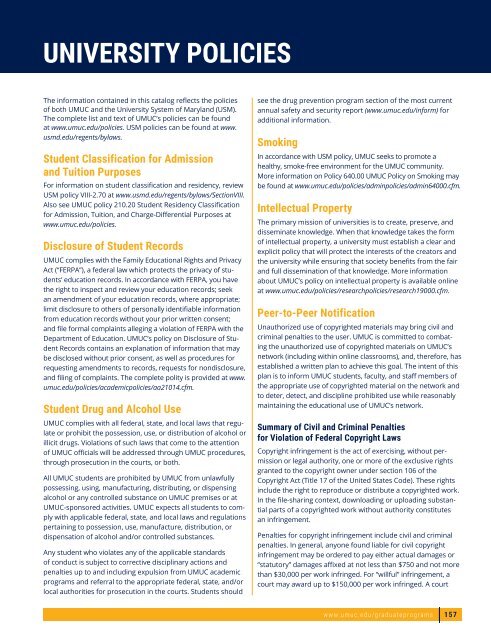2016–2017 2016–2017
2016-2017-graduate-catalog
2016-2017-graduate-catalog
Create successful ePaper yourself
Turn your PDF publications into a flip-book with our unique Google optimized e-Paper software.
UNIVERSITY POLICIES<br />
The information contained in this catalog reflects the policies<br />
of both UMUC and the University System of Maryland (USM).<br />
The complete list and text of UMUC’s policies can be found<br />
at www.umuc.edu/policies. USM policies can be found at www.<br />
usmd.edu/regents/bylaws.<br />
Student Classification for Admission<br />
and Tuition Purposes<br />
For information on student classification and residency, review<br />
USM policy VIII-2.70 at www.usmd.edu/regents/bylaws/SectionVIII.<br />
Also see UMUC policy 210.20 Student Residency Classification<br />
for Admission, Tuition, and Charge-Differential Purposes at<br />
www.umuc.edu/policies.<br />
Disclosure of Student Records<br />
UMUC complies with the Family Educational Rights and Privacy<br />
Act (“FERPA”), a federal law which protects the privacy of students’<br />
education records. In accordance with FERPA, you have<br />
the right to inspect and review your education records; seek<br />
an amendment of your education records, where appropriate;<br />
limit disclosure to others of personally identifiable information<br />
from education records without your prior written consent;<br />
and file formal complaints alleging a violation of FERPA with the<br />
Department of Education. UMUC’s policy on Disclosure of Student<br />
Records contains an explanation of information that may<br />
be disclosed without prior consent, as well as procedures for<br />
requesting amendments to records, requests for nondisclosure,<br />
and filing of complaints. The complete polity is provided at www.<br />
umuc.edu/policies/academicpolicies/aa21014.cfm.<br />
Student Drug and Alcohol Use<br />
UMUC complies with all federal, state, and local laws that regulate<br />
or prohibit the possession, use, or distribution of alcohol or<br />
illicit drugs. Violations of such laws that come to the attention<br />
of UMUC officials will be addressed through UMUC procedures,<br />
through prosecution in the courts, or both.<br />
All UMUC students are prohibited by UMUC from unlawfully<br />
possessing, using, manufacturing, distributing, or dispensing<br />
alcohol or any controlled substance on UMUC premises or at<br />
UMUC-sponsored activities. UMUC expects all students to comply<br />
with applicable federal, state, and local laws and regulations<br />
pertaining to possession, use, manufacture, distribution, or<br />
dispensation of alcohol and/or controlled substances.<br />
Any student who violates any of the applicable standards<br />
of conduct is subject to corrective disciplinary actions and<br />
penalties up to and including expulsion from UMUC academic<br />
programs and referral to the appropriate federal, state, and/or<br />
local authorities for prosecution in the courts. Students should<br />
see the drug prevention program section of the most current<br />
annual safety and security report (www.umuc.edu/inform) for<br />
additional information.<br />
Smoking<br />
In accordance with USM policy, UMUC seeks to promote a<br />
healthy, smoke-free environment for the UMUC community.<br />
More information on Policy 640.00 UMUC Policy on Smoking may<br />
be found at www.umuc.edu/policies/adminpolicies/admin64000.cfm.<br />
Intellectual Property<br />
The primary mission of universities is to create, preserve, and<br />
disseminate knowledge. When that knowledge takes the form<br />
of intellectual property, a university must establish a clear and<br />
explicit policy that will protect the interests of the creators and<br />
the university while ensuring that society benefits from the fair<br />
and full dissemination of that knowledge. More information<br />
about UMUC’s policy on intellectual property is available online<br />
at www.umuc.edu/policies/researchpolicies/research19000.cfm.<br />
Peer-to-Peer Notification<br />
Unauthorized use of copyrighted materials may bring civil and<br />
criminal penalties to the user. UMUC is committed to combating<br />
the unauthorized use of copyrighted materials on UMUC’s<br />
network (including within online classrooms), and, therefore, has<br />
established a written plan to achieve this goal. The intent of this<br />
plan is to inform UMUC students, faculty, and staff members of<br />
the appropriate use of copyrighted material on the network and<br />
to deter, detect, and discipline prohibited use while reasonably<br />
maintaining the educational use of UMUC’s network.<br />
Summary of Civil and Criminal Penalties<br />
for Violation of Federal Copyright Laws<br />
Copyright infringement is the act of exercising, without permission<br />
or legal authority, one or more of the exclusive rights<br />
granted to the copyright owner under section 106 of the<br />
Copyright Act (Title 17 of the United States Code). These rights<br />
include the right to reproduce or distribute a copyrighted work.<br />
In the file-sharing context, downloading or uploading substantial<br />
parts of a copyrighted work without authority constitutes<br />
an infringement.<br />
Penalties for copyright infringement include civil and criminal<br />
penalties. In general, anyone found liable for civil copyright<br />
infringement may be ordered to pay either actual damages or<br />
“statutory” damages affixed at not less than $750 and not more<br />
than $30,000 per work infringed. For “willful” infringement, a<br />
court may award up to $150,000 per work infringed. A court<br />
www.umuc.edu/graduateprograms 157


